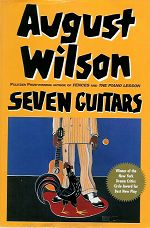- Seven Guitars
Infobox Play
name = Seven Guitars

image_size = 150px
writer =August Wilson
characters = Louise
Canewell
Red Carter
Vera
Hedley
Floyd Barton
Ruby
genre = Tragic comedy
series = "The Pittsburgh Cycle"
setting = 1940s; The backyard of a house in Pittsburgh, Pennsylvania
subject = an aspiring blues musician, a sick old man, three single women
premiere = 1994
place =Eugene O'Neill Theater Center Waterford, Connecticut
orig_lang = English
web =
ibdb_id = 7882
iobdb_id ="Seven Guitars" is a 1995 play by American
playwright ,August Wilson . It focuses on seven African American characters in the year 1948. The play begins and ends after the funeral of one of the main characters, showing events leading to the funeral in flashbacks. "Seven Guitars" represents the 1940s entry in Wilson's "Pittsburgh Cycle", a decade-by-decade anthology of African-American life inPittsburgh, Pennsylvania during the twentieth century; Wilson would revisit the stories of some of these characters in "King Hedley II ", set in the 1980s.Plot synopsis
A song Floyd "Schoolboy" Barton recorded, called "That's All Right", in the prior year has become a radio hit. Record executives have asked him to return to Chicago to record more albums. Since the recording of the first album, Floyd has squandered the flat fee he received for recording, left his girlfriend (Vera) for another woman, was then left by the other woman, pawned his guitar, and spent ninety days in jail after being arrested while walking home from his mother's funeral. After a year of trials and tribulations, Floyd is ready to right the past year's wrongs and return to Chicago with a new understanding of what's important in his life. Unfortunately his means of righting wrongs are inherently flawed.
The play's recurring theme is the African-American male's fight for his own humanity, self-understanding and self-acceptance in the face of personal and societal ills. The rooster is a recurring symbol of black man throughout the play, and provides a violent and shocking foreshadowing affect when Hedley delivers a fiery monologue and ritualistically slaughters one in front of the other characters.
Awards and nominations
;Awards
* 1996 New York Drama Critics’ Circle Award for Best Play;Nominations
* 1995 Pulitzer Prize for Drama
* 1996 Drama Desk Award for Best Play
* 1996 Tony Award for Best PlayReferences
*
External links
*
Wikimedia Foundation. 2010.
